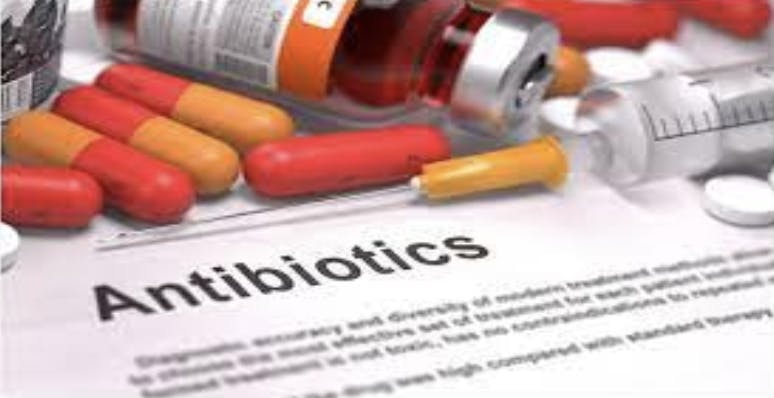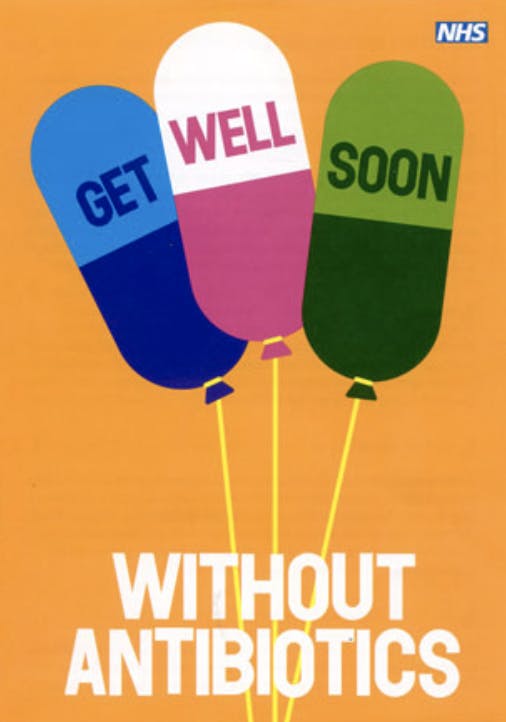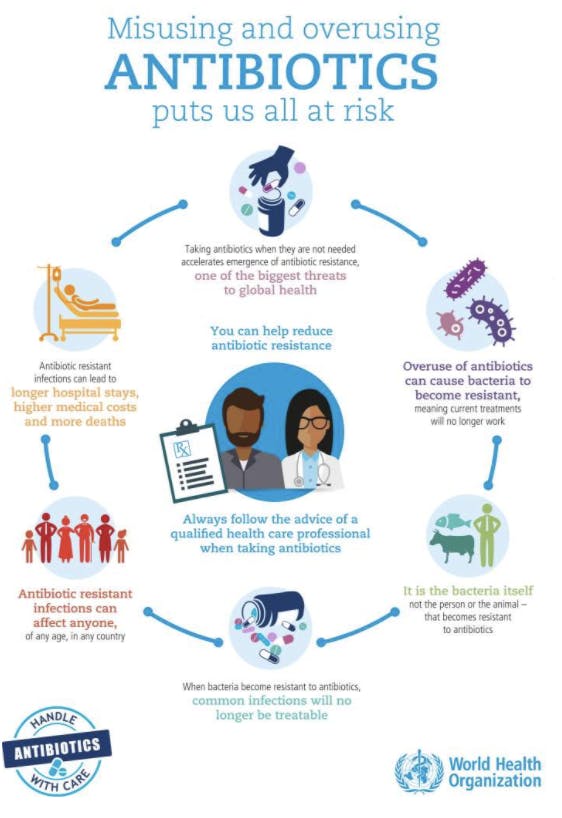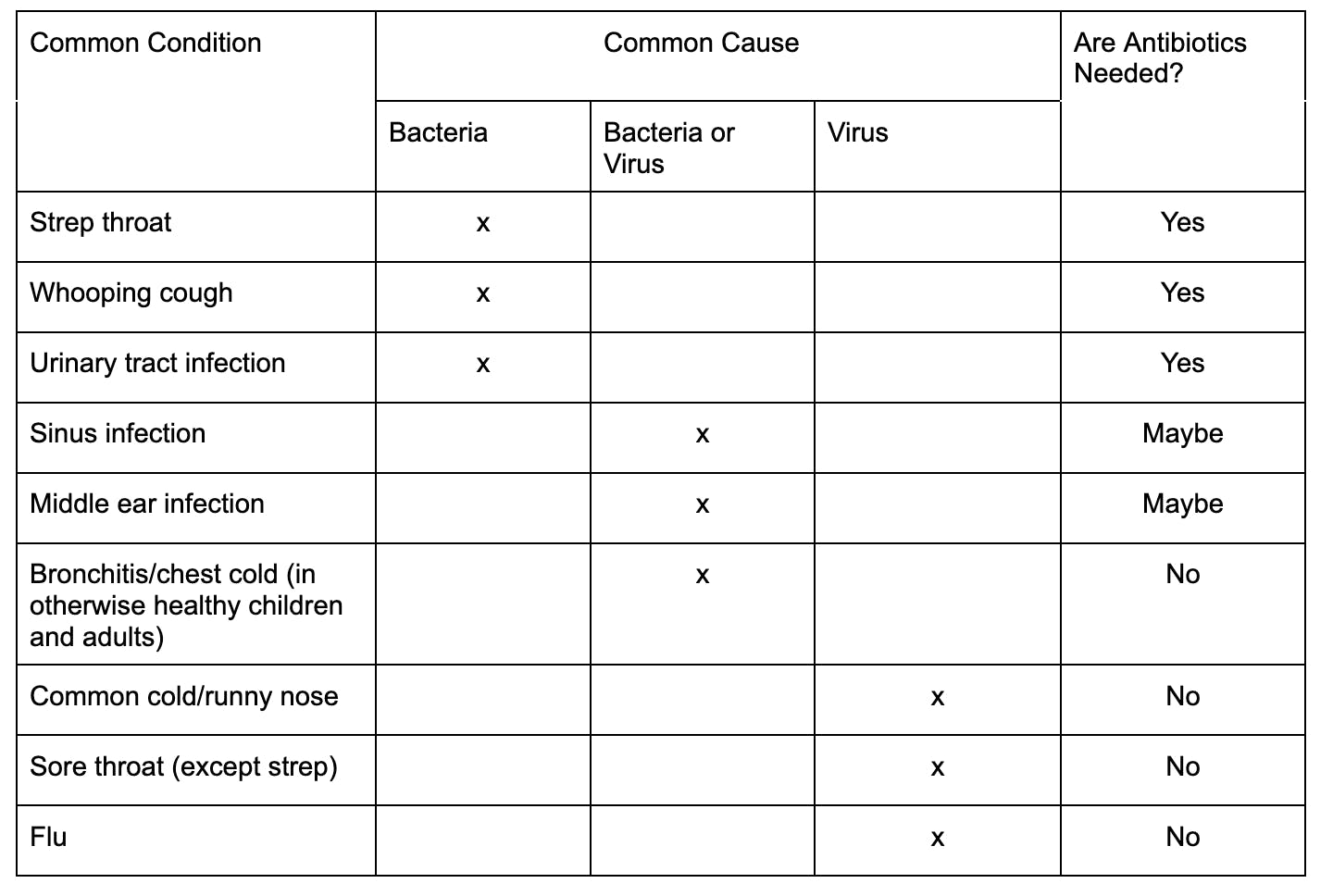TL;DR Science: Your Mini Guide For Antibiotics Usage
By Aya Khalaf
November 17, 2021 · 3 minute read
Biology
Medicine
What are antibiotics? Why should there be assistance for their usage?
Antibiotics have been an effective means of treatment in modern medicine since the 1940s. They provide defense against various diseases and infections and even save lives. However, there are many instances where antibiotics become ineffective and can cause harm to the body instead of healing it. New resistance mechanisms are emerging and spreading globally threatening our ability to treat common infectious diseases we encounter on a daily basis.

A growing list of infections - such as pneumonia, tuberculosis, blood poisoning, gonorrhea, and foodborne diseases - are becoming harder, and sometimes impossible, to treat as antibiotics become less effective. In that case, such infections can no longer be treated by first-line antibiotics, therefore more expensive medicines must be used. However, such a catalyst will do more damage than it will be of help since not everyone can afford medication nor get prescriptions from doctors and antibiotics were the way to tackle those daily diseases encountered.

Consequently, many researchers believe that this issue of antibiotics becoming less effective is due to overprescription and the urge to take antibiotics without professional assistance, especially in middle and low-income countries.
“We know many of these antibiotics are being used inappropriately,” said Eili Klein, a professor at John Hopkins University Department of Emergency Medicine. Klein also added that despite all of what’s been previously said, there is still no comprehensive body that is in charge of measuring exactly where or how.
So what if there’s an over-usage of antibiotics?
One would typically ask themselves such a question, I mean commonly, if you increase the dose of some sort of medicine, that medicine becomes more effective and helpful. Well, let’s toss that theory away - or shall I say myth - because it’s completely untrue, at least it is in the case of antibiotics. The major issue of antibiotics’ over-usage is that the bacteria - that was supposed to be killed - can develop a resistance against the antibiotic being used which can lead to severe issues in the future if not properly treated. Antibiotics have no effect on illnesses such as the common cold, but many individuals still believe that antibiotics can help treat the common cold. This misconception is dangerous. Not only can overuse or misuse of antibiotics lead to drug resistance, but it can also lead to serious health consequences such as clostridium difficile infections - also called c. diff. which causes severe diarrhea that can lead to colon damage and death.

In order to avoid such painful risky situations, first, you should acknowledge what antibiotics are really for and what they actually treat. Antibiotics treat certain infections caused by bacteria, NOT viruses. Some of the infections - caused by bacteria - antibiotics treat are:
- Bloodstream infections
- Skin abscess/impetigo
- Bacterial pneumonia
- Urinary tract infections
- Streptococcal pharyngitis
- Middle ear infections
Some of the infections - caused by viruses - antibiotics do NOT treat are:
- Colds infections
- Sore throats
- Upper respiratory infections
- Influenza or “the flu”
These infections above are caused by viruses which antibiotics can not kill nor stop from spreading. For instance, the only treatment for colds is rest and time.
What are the possible side effects of improper antibiotics use?
Improper antibiotics use has many definitions, it could mean taking an unnecessarily big dose, using the wrong antibiotics, taking them when they are not needed, and even often misinterpreting what this antibiotic is really for. Such misconceptions can really decrease the options for treatment of an option which is really nurturing the possible global issue in the healthcare sector which is called “post-antibiotic apocalypse” and the end of what we call modern medicine. Moreover, as mentioned before, misuse of antibiotics can cause a bacterial resistance - or antibiotic resistance - even to the strongest antibiotics to ever exist. The Centers for Disease and Control and Prevention (CDC) calls it “one of the world’s most pressing public health problems.”

What can one do to avoid the risk of bacterial resistance and antibiotic overuse?
There are many ways one can prevent such health problems and stay on the safe side, such methods should be established by parents first in order to teach their child whilst protecting them, and some of these ways are:
- Ask the doctor if the patient’s illness is bacterial or viral. Discuss the risks and benefits of antibiotics. If it’s a virus, ask for ways to fight the symptoms and do NOT pressure your doctor into prescribing antibiotics.
- Let milder illnesses run their course (this helps prevent germs from becoming resistant to antibiotics).
- Take antibiotics for the full amount of time and completely like prescribed by the doctor.
- Do not take antibiotics longer than prescribed.
- Antibiotics prescribed for an adult family member should not be necessarily given to children even if both parties have the same symptoms. Different bodies react differently.
The chart below shows examples of when one does and does not need antibiotics. Always keep in mind that antibiotics treat bacteria-caused infections and not virus-caused ones!

Sources:
https://www.hopkinsallchildrens.org/ACH-News/General-News/Antibiotics-When-Do-We-Really-Need-Them
https://www.cdc.gov/antibiotic-use/do-and-dont.html
https://www.gov.uk/government/news/taking-antibiotics-when-you-dont-need-them-puts-you-at-risk
https://kidshealth.org/en/parents/antibiotic-overuse.html
https://health.clevelandclinic.org/when-antibiotics-stop-working-whats-next/amp/
https://www.healthonemedicine.com/blog/antibiotics-the-pros-and-cons
https://images.app.goo.gl/MC5XnWff7RA59FPeA
Did you enjoy this article?
About The Author
Aya is a high school rising-senior. She is a huge bookworm, spends too much money on books and is basically a school nerd. Contact her at aya@sciteens.org for article suggestions and book recommendations.